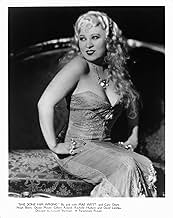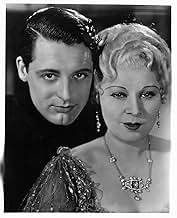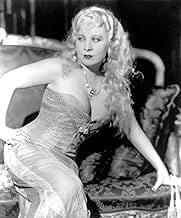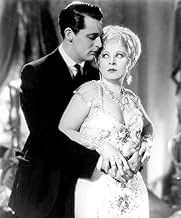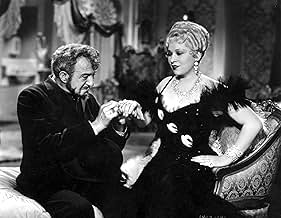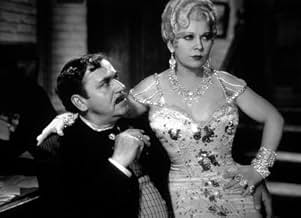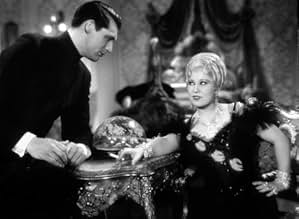IMDb RATING
6.3/10
7.4K
YOUR RATING
In the Gay Nineties, a seductive nightclub singer contends with several suitors, including a jealous escaped convict and a handsome temperance league member.In the Gay Nineties, a seductive nightclub singer contends with several suitors, including a jealous escaped convict and a handsome temperance league member.In the Gay Nineties, a seductive nightclub singer contends with several suitors, including a jealous escaped convict and a handsome temperance league member.
- Nominated for 1 Oscar
- 5 wins & 1 nomination total
Noah Beery
- Gus Jordan
- (as Noah Beery Sr.)
Robert Homans
- Doheney
- (as Robert E. Homans)
Ernie Adams
- Man in Audience
- (uncredited)
Billy Bletcher
- Singing Waiter
- (uncredited)
Wade Boteler
- Dan's Pal
- (uncredited)
Jack Carr
- Patron Who Hits His Girl
- (uncredited)
- Director
- Writers
- All cast & crew
- Production, box office & more at IMDbPro
Featured reviews
Although this really cannot be classified as a musical, it is a classic example of Mae West at her suggestive musical best and what movie audiences thought was naughty in 1933. West costars with the extraordinary Cary Grant and sings three noteworthy songs: "I Wonder Where My Easy Rider's Gone," "A Guy What Takes His Time," and "Frankie and Johnny." --from Musicals on the Silver Screen, American Library Association, 2013
She Done Him Wrong (1933)
*** (out of 4)
Set during the "Gay Ninetiest," Mae West stars as Lady Lou, a nightclub singer who pretty much seduces and vamps over any man that enters the club. Since she has her pick of the litter she sets her sights on the handsome Captain Cummings (Cary Grant).
To say SHE DONE HIM WRONG was 100% Mae West would be an understatement. The actress was a smash on Broadway and her sexual act was quite legendary even during a time when that type of thing wasn't always wanted or allowed. Her stage play was attempted to get on the big screen for a couple years before this film finally did it even though it had to be watered down some. With that said, there's still plenty of sexuality on display here, although you can't help but think this is one of the films that helped eventually bring on the Production Code.
As far as the film goes, it was a smash when it was originally released and it even got a Best Picture Oscar nomination. Watching it today the film is obviously not as strong but at the same time you can't help but watch it and just imagine how people must have felt about it in 1933. The main reason to watch this is of course for the performance of West who is pretty much playing herself. The over-the-top, heated sexuality is actually a lot of fun to watch. You know, I've never found her to be an "attractive" woman but the way she forces her sexuality is just something that works.
The supporting cast is quite good including Grant in another early role where he's pretty much playing that good looking guy that's the object of the main characters affection. Owen Moore, Noah Beery, Sr. and Gilbert Roland are all good as well. The screenplay is another plus or at least the dialogue spoken by West is. She gets a couple classic lines and her delivery is certainly a plus. With that said, the story itself is pretty hit and miss but the 66-minute running time does fly by.
*** (out of 4)
Set during the "Gay Ninetiest," Mae West stars as Lady Lou, a nightclub singer who pretty much seduces and vamps over any man that enters the club. Since she has her pick of the litter she sets her sights on the handsome Captain Cummings (Cary Grant).
To say SHE DONE HIM WRONG was 100% Mae West would be an understatement. The actress was a smash on Broadway and her sexual act was quite legendary even during a time when that type of thing wasn't always wanted or allowed. Her stage play was attempted to get on the big screen for a couple years before this film finally did it even though it had to be watered down some. With that said, there's still plenty of sexuality on display here, although you can't help but think this is one of the films that helped eventually bring on the Production Code.
As far as the film goes, it was a smash when it was originally released and it even got a Best Picture Oscar nomination. Watching it today the film is obviously not as strong but at the same time you can't help but watch it and just imagine how people must have felt about it in 1933. The main reason to watch this is of course for the performance of West who is pretty much playing herself. The over-the-top, heated sexuality is actually a lot of fun to watch. You know, I've never found her to be an "attractive" woman but the way she forces her sexuality is just something that works.
The supporting cast is quite good including Grant in another early role where he's pretty much playing that good looking guy that's the object of the main characters affection. Owen Moore, Noah Beery, Sr. and Gilbert Roland are all good as well. The screenplay is another plus or at least the dialogue spoken by West is. She gets a couple classic lines and her delivery is certainly a plus. With that said, the story itself is pretty hit and miss but the 66-minute running time does fly by.
Mae West is another one of those actresses that played the same role time after time. She played Mae West. What distinguishes the movies are the lines and she was a masterful created of double entendre with a big load of sex. She would surround herself with the actors of the day, like Gilbert Roland and Wallace Beery. The one that benefited the most here was Cary Grant. It's hard to realize that he goes back so far. I have to admit that for mot of my life I found West's thing to be off handed and tiresome. But now I know that she had great timing and and interesting stage presence. She could deliver a "dirty" line like no other. This gave us the famous like, "Come up and see me sometime."
Mae West was a veteran of burlesque, vaudeville and the Broadway stage by the time she made her first film in 1932 at the age of 39. `She Done Him Wrong' was her second film and her first starring role in an adaptation of her smash Broadway hit `Diamond Lil'. It was a play that West had written herself and it played to packed houses on Broadway for years. This film was nominated for an Academy Award for best picture and made Cary Grant into an instant star. Mae went on to write nine of the fourteen screenplays for films in which she was to star. Thus, all those great quotes we've heard that are attributed to her were not only said by her, but written by her as well. By 1935, she was the most highly paid woman in America. To this day, she remains one of the female stars most often imitated by female impersonators.
This film is among her best. It is full of the bawdy double entendre that became her trademark. She was the queen of sexual innuendo and suggestive dialogue and many of her lines have become part of Americana (e.g. `Is that a gun in your pocket or are you just glad to see me?' And, `A hard man is good to find.' And of course, `Come up and see me sometime.')
The plot of this film is simplistic and it is clearly a vehicle for her enormous talent, leading up to the now famous proposal by Cary Grant at the end of the film. Mae commands every frame of the film with her incomparable combination of sex appeal and ribald humor. Her sense of comic timing is impeccable making the funny lines she writes that much more hilarious by the snide way in which she delivers them.
Before this film, Cary Grant had appeared in half a dozen films and was building a reputation as a solid actor. However, none of his early films gave him the exposure that this film did due to its wild popularity at the time. West handpicked him for the part saying that he combined virility with the bearing of a gentleman. She wanted someone who would epitomize the now famous line, `Hello, warm, dark and handsome.' Though his role in this film is minor compared to West's, it made him a household name and a bankable star.
This classic film is a piece of film history that shouldn't be missed. I rated it a 10/10. It is among Mae West's best moments. I highly recommend it.
This film is among her best. It is full of the bawdy double entendre that became her trademark. She was the queen of sexual innuendo and suggestive dialogue and many of her lines have become part of Americana (e.g. `Is that a gun in your pocket or are you just glad to see me?' And, `A hard man is good to find.' And of course, `Come up and see me sometime.')
The plot of this film is simplistic and it is clearly a vehicle for her enormous talent, leading up to the now famous proposal by Cary Grant at the end of the film. Mae commands every frame of the film with her incomparable combination of sex appeal and ribald humor. Her sense of comic timing is impeccable making the funny lines she writes that much more hilarious by the snide way in which she delivers them.
Before this film, Cary Grant had appeared in half a dozen films and was building a reputation as a solid actor. However, none of his early films gave him the exposure that this film did due to its wild popularity at the time. West handpicked him for the part saying that he combined virility with the bearing of a gentleman. She wanted someone who would epitomize the now famous line, `Hello, warm, dark and handsome.' Though his role in this film is minor compared to West's, it made him a household name and a bankable star.
This classic film is a piece of film history that shouldn't be missed. I rated it a 10/10. It is among Mae West's best moments. I highly recommend it.
Set mostly in a bawdy saloon/dance hall in NYC during the 1890s, this film is a showcase for the talents of Mae West. She plays Lady Lou, a self-confident, sassy singer with a quick wit, who entertains customers with songs that have a Blues theme and were popular in vaudeville.
In this role, buxom Mae West is at her best. She struts her stuff, she wears tons of diamonds, she smiles in a slightly mischievous way, she rolls her eyes, and she speaks in a voice that is more than a little nasal. Her costumes are glamorous and flamboyant. In short, she presents an on-screen image that is wonderfully ... unique.
The film's story is thin and largely irrelevant. It involves the people around Lady Lou, some of whom are schemers and cheats. Implicit sexual references in the dialogue, and the character of Lady Lou, led the "National Legion of Decency" to push down our throats the Production Code, a wretched policy device that censored cinematic content for some thirty years thereafter.
If I have a complaint with this film it is that the story is too serious. Mae West is placed in scenes that allow her merely to recite dialogue. She is less an actress than a singer and on-stage performer. I would have preferred a more lighthearted musical theme, to play up her musical talents.
And so for me, the best parts of this film are the musical numbers few though they may be. Mae West sings "Frankie And Johnny" and a couple of other songs. One of my favorite sequences occurs about midway through the film. In what appears to be an authentically designed music hall set, an Irish tenor with a big mustache sings "Silver Threads Among The Gold", a musical tearjerker popular with barbershop quartets of that era. The song's sad theme prompts a man in the audience literally to "cry in his beer". Gas lights point upward to the stage. And behind the singing tenor, a curtain sways back and forth, with product signs that read "Old Whiskey", "Dijon Burgundy", among others. It's a sequence that is straight out of vaudeville. Marvelous!
"She Done Him Wrong" is a film whose story almost gets in the way of the main character, played by a legendary talent. The film is worth watching more than once, but only to see marvelous Mae West, and to listen to those wonderful songs from the bygone days of vaudeville.
In this role, buxom Mae West is at her best. She struts her stuff, she wears tons of diamonds, she smiles in a slightly mischievous way, she rolls her eyes, and she speaks in a voice that is more than a little nasal. Her costumes are glamorous and flamboyant. In short, she presents an on-screen image that is wonderfully ... unique.
The film's story is thin and largely irrelevant. It involves the people around Lady Lou, some of whom are schemers and cheats. Implicit sexual references in the dialogue, and the character of Lady Lou, led the "National Legion of Decency" to push down our throats the Production Code, a wretched policy device that censored cinematic content for some thirty years thereafter.
If I have a complaint with this film it is that the story is too serious. Mae West is placed in scenes that allow her merely to recite dialogue. She is less an actress than a singer and on-stage performer. I would have preferred a more lighthearted musical theme, to play up her musical talents.
And so for me, the best parts of this film are the musical numbers few though they may be. Mae West sings "Frankie And Johnny" and a couple of other songs. One of my favorite sequences occurs about midway through the film. In what appears to be an authentically designed music hall set, an Irish tenor with a big mustache sings "Silver Threads Among The Gold", a musical tearjerker popular with barbershop quartets of that era. The song's sad theme prompts a man in the audience literally to "cry in his beer". Gas lights point upward to the stage. And behind the singing tenor, a curtain sways back and forth, with product signs that read "Old Whiskey", "Dijon Burgundy", among others. It's a sequence that is straight out of vaudeville. Marvelous!
"She Done Him Wrong" is a film whose story almost gets in the way of the main character, played by a legendary talent. The film is worth watching more than once, but only to see marvelous Mae West, and to listen to those wonderful songs from the bygone days of vaudeville.
Did you know
- GoofsShadow of camera moves against the back wall of Lady Lou's apartment while she and Sally are talking.
- Alternate versionsMaryland, Massachusetts, New York, Ohio, and Pennsylvania removed the song "A Guy What Takes His Time". Will H. Hays and Adolph Zukor went to New York to edit the song to an entrance by Mae West, one opening verse, and one closing verse to lessen the suggestiveness. Despite this, Ohio and Pennsylvania cut all of West's one liners.
- ConnectionsFeatured in The Twentieth Century: The Movies Learn to Talk (1959)
- How long is She Done Him Wrong?Powered by Alexa
Details
Box office
- Budget
- $200,000 (estimated)
- Runtime
- 1h 6m(66 min)
- Color
- Aspect ratio
- 1.37 : 1
Contribute to this page
Suggest an edit or add missing content


